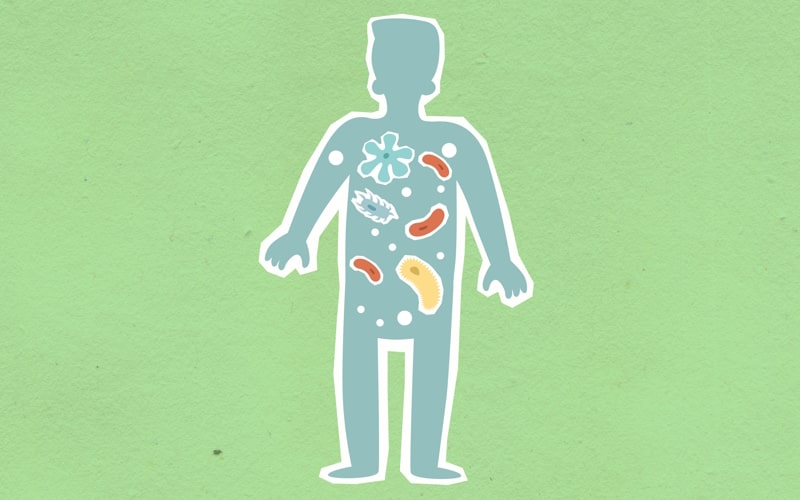
Can Gut Bugs Really Control Your Mind?
Table of Contents
The human body is a complex ecosystem of microorganisms important in maintaining our overall health. The gut, in particular, is home to trillions of microorganisms, collectively known as the gut microbiome. Recent studies have shown that these tiny creatures can influence various aspects of our physical and mental health, including brain function.

What Are Gut Microbes, And How Do They Affect Us?
Gut microbes are microorganisms, including bacteria, viruses, fungi, and protozoa, that reside in the human digestive system, primarily in the large intestine. These microbes, also known as the gut microbiota, play an essential role in maintaining human health and are involved in various physiological processes, including digestion, metabolism, immune system function, and brain function.

The gut microbiota also produces essential nutrients, such as vitamin K and certain B vitamins, that the human body cannot produce on its own. They also break down indigestible dietary fiber and produce short-chain fatty acids, which have been linked to numerous health benefits, including reduced inflammation and improved insulin sensitivity.
Recent research has shown that gut microbiota can affect various aspects of human health, including mental health, obesity, and autoimmune disorders. For example, studies have suggested that gut microbes can influence mood and behavior by producing neurotransmitters such as serotonin and dopamine. Moreover, imbalances or disruptions in the gut microbiota, such as dysbiosis, have been associated with several chronic health conditions, including inflammatory bowel disease, type 2 diabetes, and depression.
Therefore, maintaining a healthy gut microbiota through a balanced diet, regular exercise, and reducing the use of antibiotics is crucial for overall health and wellbeing.
How The Microbes In Our Gut Influence Our Brain
The human gut contains a complex community of microorganisms known as the gut microbiota. Recent research has revealed that these microbes play a critical role in regulating a wide range of physiological and metabolic functions, including communication between the gut and the brain.

There are several ways in which the microbes in our gut can influence our brain:
- The gut-brain axis: The gut and the brain are connected by a bidirectional communication system known as the gut-brain axis. This communication occurs through the vagus nerve, which transmits signals from the gut to the brain and vice versa. The gut microbiota can influence this communication by producing neurotransmitters, such as serotonin and GABA, which regulate mood and behavior.
- Immune system modulation: The gut microbiota also plays an important role in modulating the immune system. Recent studies have shown that gut microbes can influence the production of cytokines, which are signaling molecules that regulate immune responses. Dysregulation of the immune system has been linked to several neurological disorders, including depression and anxiety.
- Short-chain fatty acids: The gut microbiota can produce short-chain fatty acids (SCFAs) through the fermentation of dietary fiber. These SCFAs have been shown to have a wide range of beneficial effects on the brain, including reducing inflammation, promoting neurogenesis, and improving cognitive function.
- Gut permeability: The gut microbiota can also influence the permeability of the gut barrier. When the gut barrier is compromised, bacteria and other toxins can leak into the bloodstream, triggering an immune response that can lead to inflammation and oxidative stress. These factors have been implicated in the development of several neurological disorders, including Parkinson’s disease and Alzheimer’s disease.
In summary, the microbes in our gut play a critical role in regulating the gut-brain axis, modulating the immune system, producing short-chain fatty acids, and maintaining gut permeability. These effects can profoundly impact brain function and behavior, highlighting the importance of maintaining a healthy gut microbiota.
Maintaining a Healthy Gut Microbiome
Maintaining a healthy gut microbiome is vital for overall health and wellbeing. Here are some tips for keeping your gut microbiome healthy:

- Eat a balanced diet: Eating a diet rich in fiber, fruits, vegetables, and fermented foods can help promote a healthy gut microbiome. Fiber is especially important because it serves as food for the beneficial bacteria in your gut.
- Avoid processed foods: Processed foods can be low in fiber and high in sugar and unhealthy fats, which can disrupt the balance of your gut microbiome. Limit your processed food intake and opt for whole, unprocessed foods instead.
- Take probiotics: Probiotics are live microorganisms that can be beneficial for gut health. You can find probiotics in fermented foods like yogurt, kefir, and sauerkraut or in supplement form.
- Reduce stress: Stress can have a negative impact on your gut microbiome. Practicing stress-reducing activities like yoga, meditation, or deep breathing can help promote a healthy gut microbiome.
- Get enough sleep: Lack of sleep has been linked to dysbiosis and can disrupt the balance of your gut microbiome. Aim for 7-8 hours of sleep each night to promote a healthy gut microbiome.
- Limit antibiotics: Antibiotics can disrupt the balance of your gut microbiome by killing off both harmful and beneficial bacteria. Only take antibiotics when necessary, and always follow your healthcare provider’s instructions.
In summary, maintaining a healthy gut microbiome requires a balanced diet, stress management, good sleep hygiene, and limiting the use of antibiotics. Taking care of your gut microbiome can help promote overall health and wellbeing.
Сonclusion
In conclusion, the gut microbiome plays a crucial role in our overall health and wellbeing. It is a complex ecosystem of microorganisms that can influence various aspects of our physical and mental health, including brain function. By maintaining a healthy gut microbiome through a healthy diet and lifestyle, we can promote our overall health and wellbeing.
